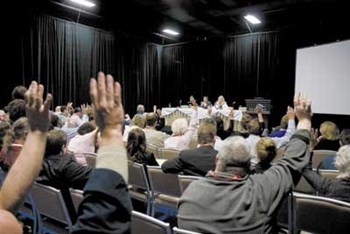
Congratulations, you’ve been elected to serve on your building’s board. You managed to convince the rest of the building that you know enough about building systems or law or economics or even people-pleasing to make them vote for you and give you a position of power.
Before you pop open that bottle of champagne however, it's helpful to know what you’re getting yourself into. While you may have convinced the other residents that you know what you’re doing, do you really understand the ins-and-outs of the building’s laws and politics, so that you can do a great job and make lasting, positive changes?
With Great Power Comes...
Managing a building that is both a home and an investment is a huge responsibility, and it’s one of the rare jobs that requires no previous experience—or even knowledge—of the work you’re about to do. Depending on your role (president, vice president, secretary or treasurer) you’ll be responsible for your own set of tasks ranging from balancing the budget to taking scrupulous notes and uploading them to your building’s website.
Some jobs even carry legal consequences, and you’ll have to be very aware of the building’s documents to make sure you’re following the rules exactly. Board members don’t necessarily come to the job knowing everything they need to know in order to fulfill their role—and veteran board members don’t miraculously learn new skills or gain knowledge of new legislation or protocols just by serving on their board.
Both new and incumbent board members need refreshers now and again, in the form of courses, seminars and newsletters designed to enrich their understanding and add new skills to their administrative and managerial toolkit.
Think you’re prepared because you’ve never missed a board meeting? Think again. There’s a lot of behind-the-scenes work that you may never have suspected.
Sounds like an overwhelming task, especially since you’re not being paid for all the work you’re about to do? It doesn’t have to be. There are a ton of resources and helpful people in New York who can help you decipher your new role, and help you become a superstar board member ASAP.
First Things First
The first things you should look to master are the basic skills needed to be a board member.
Communication skills, organizational leadership and problem solving skills are always helpful for those wishing to work on a board with other people, says Kevin Culler, president and owner of Heritage Management Services, LLC, in New York. And essential to that aim is a basic understanding of the building’s legal documents, such as the offering plan or proprietary lease, he says.
Simply having the confidence to question things if you don’t understand them is also important, says Jack Nyman, director of the Steven L. Newman Real Estate Institute at Baruch College in New York.
Fortunately, there isn’t much you can’t learn. In some states board member education is mandatory. In Florida, for example, a new law requires newly-elected board members to take a class certified by the Florida Department of Business and Professional Regulation—or they must sign a document saying that they read and understood all of the Florida building laws in addition to their governing documents.
In New York, that law doesn’t exist—but that doesn’t mean that it’s not important to brush up on your skills or to learn new skills before and during your board tenure.
Fortunately, there are countless places to learn whatever you need to know to be a well-informed board member in New York.
Veteran or more knowledgeable board members could also be called upon to provide their own informal orientation or training but there are also many places to continue your learning more formally.
At Baruch College, you could take continuing education classes in real estate, finance, budgeting, and facilities management. Classes there range from Legal and Administrative Issues in Multiple Dwelling Unites, to Green Buildings to Contract Law and Fundamentals of Project Management.
Or, you could check out the Council of New York Cooperatives & Condominiums (CNYC), which is a not-for-profit organization that hosts seminars, events, workshops, e-mails, newsletters and classes for the sole purpose of helping board members and residents understand how to manage their buildings properly.
More Options
New boards should also look at the workshops and seminars offered by the Federation of New York Housing Cooperatives & Condominiums, which also publishes many useful pamphlets and documents on just about every housing topic that may interest you. Other classes are available through the Association of Riverdale Cooperatives and the Urban Homesteading Assistance Board.
Longer courses for more intensive learning are available through The New School or the Real Estate Institute at New York University.
Once you master the basics, and have the ability to put them to use in your building, you can actually save your condo or co-op a ton of money.
“Up-to-date knowledge that can be applied to your properties that may enable you to save on operating costs and lower expenses over the long term, will have noticeable payback to all the building’s residences,” Nyman says.
If you know the tricks to using alternative energy sources, or doing some repair work yourself—or even bargaining with vendors, then the cost of the courses will quickly diminish when it comes to look at your long-term savings, he says.
Once you start taking classes, you will also meet many other real estate professionals and board members, who offer networking opportunities.
“These relationships can evolve into mentoring opportunities, or create an educational sharing platform that may enable a board member to get an answer to a particular question on the spot, Nyman says.
Instructors will also bring current real-life scenarios and examples to the classroom, so board members will receive up-to-date knowledge that can instantly be applied to their properties.
Board Benefits
Issues such as bedbugs, environmental concerns and new fire codes are topics that everyone—even long-term board members—can benefit from, and classes on those topics and more are frequently covered via newsletters or one-day seminars in those organizations.
One of the best parts about taking a continuing education class or even brushing up your board skills by reading co-op or condo articles in publications like The Cooperatoror searching for advice over the Internet, is that you’ll see immediate results, says Margie Russell, executive director of the New York Association of Realty Managers (NYARM).
“It’s immediate improvement over whatever point you’re at on the scale,” she says.
And while there are many benefits to taking classes, there are also various costs involved. There is a tremendous variation in the costs of the classes, says Mary Ann Rothman, CNYC’s executive director. Membership in many real estate organizations brings down the price—and sometimes, they offer free classes.
Courses offered at universities and other private institutions range depending on the nature of the course, and whether it is part of an overall certificate program.
For example, at Baruch, student board members can take a one-day notary course for $95, or can take a full general real estate course for $395-$525. At Baruch, you can also enroll in the certificate program for $1,499-$2,900 if paid in full at the start of the program.
If you don’t belong to a real estate organization or club, and don’t have the budget for a college class, you can read the real estate trade magazines to find plenty of free seminars in your area, Russell says. Even the seminars you pay for will have minimal costs, she says. Russell suggests that the building pay for all the classes that board members take—because they’re taking the classes to improve the building. And, she says, most buildings will be happy to fund the courses. Rothman agrees, going one step further.
“Managers and board members should require it, encourage it and fund it,” she says.
Typically, however, the board members normally fund the course, while the association pays for the membership of the board for organizations, Culler says. He suggests that the community association should budget for the organization’s annual dues while the board members pay the expense of the courses, lectures and workshops that they want to take.
And while the boards can only require that board members take the classes if this is written in the board’s governing documents, it may be worth it to add that clause to make it official.
Even if taking classes isn’t required, it should be encouraged, Russell says.
“You have to talk about continuing education,” she says. “Bring it up at the board meetings, and make it a policy that everyone participate and look at the classes and reading material. It’s worth it.”
It’s Worth It
At the very least, board members should distribute any articles of interest from trade publications so everyone can stay informed via the reading material, Culler says. “Today, the Internet is also an ideal tool to research various community association issues,” he says.
Create an entire packet which consists of various articles, and you can put it into a folder to hand out whenever a board changes, and new members are elected so they can instantly be informed of all the basics of sitting on a board.
The bottom line is that being on a board of a co-op or a condo is no picnic. There are tons of decisions to be made, disputes to settle, finances to keep track of and a chance of being sued for a slip-up. But there are great benefits to serving your community and it only makes sense to be as knowledgeable as possible.
Danielle Braff is a freelance writer and a frequent contributor to The Cooperator.






Leave a Comment